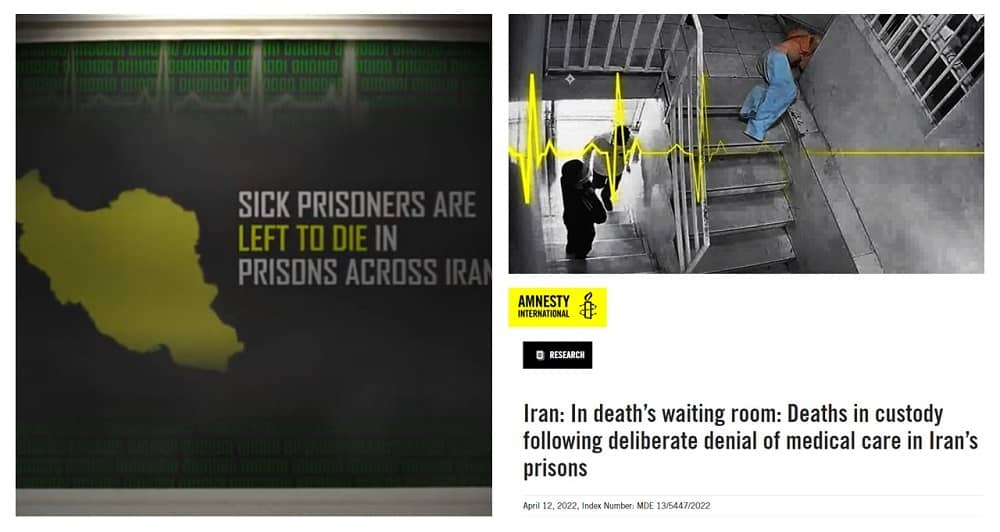
April, 12, 2022: Amnesty International has published a report on the Iranian regime’s prisons; “In death’s waiting room: Deaths in custody following deliberate denial of medical care in Iran’s prisons”.
As it is written in the introduction of this report on the website of Amnesty International: “This briefing documents how Iranian officials are committing shocking violations of the right to life by deliberately denying ailing prisoners lifesaving healthcare and refusing to investigate and ensure accountability for unlawful deaths in custody. The briefing details the circumstances surrounding the deaths in custody of 92 men and four women in 30 prisons in 18 provinces across Iran since 2010.”
Below are the excerpt sections of this report that have been published on the Amnesty International website:
Consistent with entrenched patterns of systematic impunity in Iran, to date, the authorities have refused to conduct any independent and transparent investigations into deaths in custody involving reports of denial of medical care and have failed to ensure that those suspected of criminal responsibility are prosecuted and punished.
“The Iranian authorities’ chilling disregard for human life has effectively turned Iran’s prisons into a waiting room of death for ill prisoners, where treatable conditions tragically become fatal,” said Diana Eltahawy, Deputy Regional Director for the Middle East and North Africa at Amnesty International.
“Deaths in custody resulting from the deliberate denial of healthcare amount to arbitrary deprivation of life, which is a serious human rights violation under international law. A prisoner’s death in custody also constitutes an extrajudicial execution, a crime under international law, if those responsible either intended to cause the death or knew with a sufficient degree of certainty that death would be the necessary consequence of their unlawful actions yet persisted.”
The briefing, which details the circumstances surrounding the death in custody of 92 men and four women in 30 prisons in 18 provinces across Iran since January 2010, is based on Amnesty International’s documentation of a selection of illustrative cases, long-term findings on deliberate denial of access to adequate healthcare in Iran’s prisons, and a comprehensive review of reporting by independent human rights group.
The 96 cases reviewed are illustrative, rather than exhaustive, since the true number of deaths in custody is likely far higher. This is because human rights violations in Iran often go unreported due to well-founded fears of reprisals.
The list of cases excludes deaths in custody involving credible reports of physical torture or the use of firearms, which Amnesty International addressed in a separate output in September 2021.
Ailing prisoners left to die
Amnesty International documented the fatal consequences resulting from prison officials’ common practice of denying or delaying hospital transfers for critically ill prisoners.
The organization also documented how prison officials frequently deny prisoners access to adequate healthcare, including diagnostic tests, regular check-ups, and post-operative care, throughout their imprisonment, which leads to worsening health problems, inflicts additional pain and suffering on sick prisoners, and ultimately causes or contributes to their untimely deaths.
In Iran, prison clinics are not equipped with the facilities required for addressing complex health problems. Nor are they staffed by an adequate number of qualified general practitioners, let alone medical specialists, who are only required to visit for one or several hours during the week “as needed”. As a result, prisoners who experience medical emergencies and need specialized medical care must always be immediately transferred to outside medical facilities.
Sixty-four out of the 96 prisoners, whose cases Amnesty International reviewed, died in prison. Many died in their prison cells which means they were not given basic medical supervision in their final hours. Some died while held in poorly equipped and staffed prison clinics.
At least 26 prisoners died during transfer or shortly after admission to hospital, following deliberate delays by prison medical staff and/or prison officials, which proved fatal.
In at least six cases, critically ill prisoners were moved to solitary confinement, punishment wards, or quarantine sections; four of them died alone in prison while two were eventually authorized for hospital transfers, but it proved too late.
In many cases, both prison clinic medical staff and prison officials accused prisoners experiencing medical emergencies of “faking” or “exaggerating” their symptoms.
Lives cut short
In the vast majority of cases, prisoners who died were young or middle aged – 23 were between the ages of 19 and 39, and 26 between the ages of 40 and 59, raising further concerns that lives are being cut short by denial of healthcare.
Impunity
The crisis of systemic impunity prevailing in Iran has emboldened prison officials to persist with deadly denial of medical care to prisoners.
The crisis is characterized not only by the authorities’ systematic refusal to investigate, but also by their promotion of narratives praising the quality of health services offered to prisoners as “exemplary” or “unparalleled” throughout the world, which indicates that they have no intent to change course.
The full text of this report in PDF format can be downloaded at the following link:
https://www.amnesty.org/en/wp-content/uploads/2022/04/MDE1354472022ENGLISH.pdf